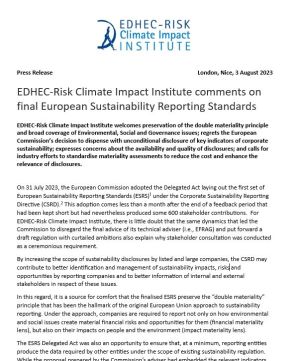
EDHEC-Risk Climate comments on final European Sustainability Reporting Standards
Written on 07 Aug 2023.

EDHEC-Risk Climate Impact Institute welcomes preservation of the double materiality principle and broad coverage of Environmental, Social and Governance issues; regrets the European Commission’s decision to dispense with unconditional disclosure of key indicators of corporate sustainability; expresses concerns about the availability and quality of disclosures; and calls for industry efforts to standardise materiality assessments to reduce the cost and enhance the relevance of disclosures.
On 31 July 2023, the European Commission adopted the Delegated Act laying out the first set of European Sustainability Reporting Standards (ESRS)[1] under the Corporate Sustainability Reporting Directive (CSRD).[2] This adoption comes less than a month after the end of a feedback period that had been kept short but had nevertheless produced some 600 stakeholder contributions. For EDHEC-Risk Climate Impact Institute, there is little doubt that the same dynamics that led the Commission to disregard the final advice of its technical adviser (i.e., EFRAG) and put forward a draft regulation with curtailed ambitions also explain why stakeholder consultation was conducted as a ceremonious requirement.
By increasing the scope of sustainability disclosures by listed and large companies, the CSRD may contribute to better identification and management of sustainability impacts, risks and opportunities by reporting companies and to better information of internal and external stakeholders in respect of these issues.
In this regard, it is a source for comfort that the finalised ESRS preserve the “double materiality” principle that has been the hallmark of the original European Union approach to sustainability reporting. Under the approach, companies are required to report not only on how environmental and social issues create material financial risks and opportunities for them (financial materiality lens), but also on their impacts on people and the environment (impact materiality lens).
The ESRS Delegated Act was also an opportunity to ensure that, at a minimum, reporting entities produce the data required by other entities under the scope of existing sustainability regulation. While the proposal prepared by the Commission’s adviser had embedded the relevant indicators, as mandated by the CSRD,[3] this Delegated Act falls short of ensuring that reporting entities produce data that other parties require to comply with the extant European Union sustainability regulation.
In this regard the Delegated Act allows reporting entities to disclose voluntarily in respect of certain issues (irrespective of their impact or financial materiality), to withhold disclosure for non-material issues (apart from core general disclosures), and to avail of further flexibility in respect of certain mandatory disclosures (it also introduces multiple phase-ins).
We also observe that owing to the disclosure leeway afforded to reporting entities, it is doubtful this Delegated Act will deliver the much-needed improvement in data availability and quality pertaining to environmental and social issues that are central to the European Union’s sustainability commitments and ambitions.
We find that giving each reporting entity wide and large discretion over the definition of materiality in respect of such central issues is unwise. Subjecting most disclosures to corporate-specific materiality testing should indeed be expected to produce piecemeal and inconsistent disclosures that critically undermine the intention of the CSRD to increase the availability, quality, comparability, and reliability of corporate sustainability information. This is all the truer as third-party assurance and supervisory practices in the emergent field of double materiality will require guidance and time to converge.
As we had underlined in our public feedback to the Commission (https://ec.europa.eu/info/law/better-regulation/have-your-say/initiative...), the extent of discretion awarded by Delegated Act with respect to the appreciation of what should be reported fails to send a clear signal to these entities about the urgency and criticality of integrating sustainability risks and impact into operations. Allowing reporting entities to dispense of explanations of why they may consider a particular sustainability topic not to be material adds insult to injury – elevating opacity as a principle of transparency regulation in this way facilitates strategic selection of disclosures by reporting entities, which is one key dimension of sustainability-washing. This is why we had suggested that materiality assessments and their conclusions be disclosed including when a topic is considered not material.
EDHEC-Risk Climate Impact Institute Director Frédéric Ducoulombier commented: “As a research centre specialised on climate issues, we regret that the Delegated Acts fails to make climate-related disclosures mandatory but welcome the Commission’s last-minute Adjustment requiring the disclosure of a detailed explanation when a reporting entity concludes that climate change is not material.”[4]
“We also regret that the Commission missed an opportunity to provide clear, science-based, guidance on materiality assessments and set minimum criteria to be respected by reporting entities; we understand that EFRAG is tasked with producing guidance on materiality assessment in the short term and call on reporting entities, the reporting ecosystem, and stakeholder groups to contribute to efforts aimed at enhancing the availability and quality of data that are key to the EU sustainable finance framework and the promotion of positive change on the ground,” he added.
[1] The first set of disclosures pertains to sector-agnostic and cross-cutting indicators.
[2] The CSRD (2022/2464) amended the Accounting Directive (2013/34/EU) and this delegated act is based on Article 29b(1), first subparagraph, of the Accounting Directive.
[3] The regulator has imposed sustainability integration and/or reporting obligations upon Financial Market Participants (FMPs) in respect of their investments (via the Benchmark Regulation [BMR], the Sustainable Finance Disclosure Regulation [SFDR], and the Capital Requirements Regulation [CRR] notably) before requiring the corresponding disclosures of investee companies (via the CSRD). This has limited the reliability and comparability – and therefore the usefulness – of the data produced by FMPs, has done little to encourage the integration of sustainability issues “in the real world”, and may have contributed to greenwashing in the financial industry. Article 1(8) of the CSRD (adding Article 29(b)5 to the Accounting Directive) provided that the ESRS delegated act should at least include the information that FMPs need to comply with the SFDR; and the advice given by EFRAG to the European Commission in November 2022 had embedded (for mandatory reporting) the indicators and/or datapoints required for compliance with the SFDR, BMR, and CRR, among other relevant texts.
[4] As for other sustainability issues, the finalised act only requires that an entity explicitly state where each datapoint pertaining to requirements under the SFDR, BMR or the CRR can be found in its sustainability statement or indicate that it is (assessed as) not material.
Access the Word version of the press release.


